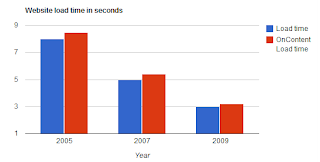The sample code was well structured and easy to incorporate into my page, although there are a few hiccups (such as not showing up correctly on an iPhone or an iPad), but this beats the alternative of writing your own script. What is more impressive, is that these calls are very fast! You can change the Google sample code interactively by going to their site at:
http://code.google.com/apis/ajax/playground/?type=visualization#gauge_interaction.
